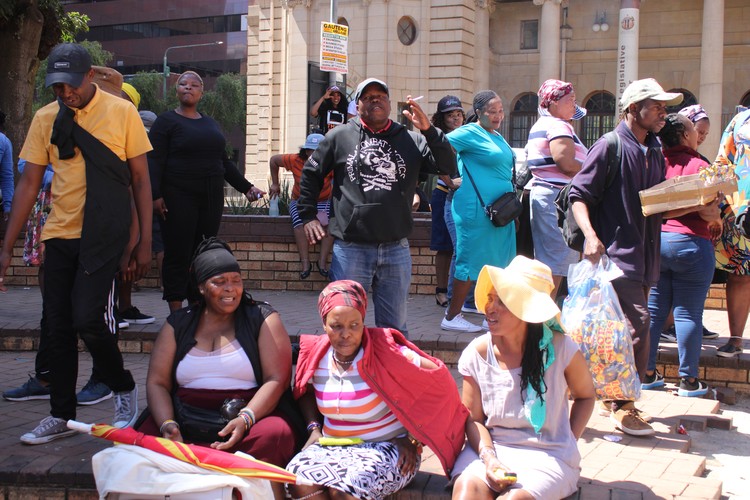Call for Johannesburg to turn “dark buildings” into decent housing for poor people
Housing collective plans march in city next month to demand housing for the poor
Activists and residents of “dark buildings” in Johannesburg’s inner-city met outside the Library Gardens on Saturday to discuss the housing and service delivery needs. Photo: Kimberly Mutandiro
- Activists, unions leaders and residents of other “dark buildings” in Johannesburg’s inner-city will protest next month to demand urgent steps be taken to provide dignified housing for poor people.
- They made this decision at a gathering on Saturday in the city centre to discuss housing and other shortfalls.
- This comes a couple of weeks after 77 people died and many others were injured when the 80 Albert Street building burnt down. The occupied building was one of the inner city’s “dark buildings”.
Scores of activists, unions and residents of other “dark buildings” in Johannesburg’s inner-city are to take to the streets on 1 October. They will demand that local and provincial authorities take urgent steps to provide dignified housing for poor people.
This was agreed at a meeting on Saturday outside the Library Gardens in the city centre where attendees discussed ways to avoid yet another deadly disaster. At least 77 people died and many others were injured in the inferno which engulfed 80 Albert Street, one of the city centre’s “dark buildings”.
A statement by the Inner-City Federation, the main organiser of the event, said that the deaths were a consequence of a failure of the government to address poverty, unemployment and the acute housing shortage.
Some of the other organisations at the meeting included SAFTU, Kopanang Africa Against Xenophobia, General Industries Workers Union of SA (GIWUSA), The Informal Traders Forum, and Abahlali Basemjondolo.
“This tragedy must be laid at the doorstep of the political elite who continue to plunder state resources through corruption and mismanagement. They have also jumped on the rising bandwagon of xenophobia we are experiencing in South Africa, blaming “undocumented migrants” for the fire,” said President of GIWUSA Mametlwe Sebei, while reading out a memorandum.
Activists also accused government staffers of being hypocritical, by blaming organisations such as the Socio-Economic Rights Institute of SA (SERI) and Lawyers for Human Rights which have been defending the constitutional rights of people living in these buildings against evictions.
The attendees called for an independent investigation into the cause of the Albert Street building fire, and for the victims and their families to be compensated. They also want the occupied buildings to be refurbished and programmes to assist homeless people and small businesses.
Zwelethu Ndlovu from the Inner-City Federation, who is also a resident in one of the inner-city “dark buildings”, said they had been speaking to City officials since 2015 but this had not yet yielded results.
“Politicians come up with promises during elections. It’s amazing that politicians are blaming foreign nationals and NGOs because there is an election coming,” Ndlovu said.
He said many people in occupied buildings had been issued with eviction notices following the building fire. “We are mobilising ourselves to fight against the violation of our constitutional rights. The PIE Act is clear that people should not just be evicted and thrown out on the streets. Ndlovu suggested that these buildings should be refurbished rather than people being evicted from them.
Sphiwe Mbatha from Kopanang Africa Against Xenophobia said that it was unfair to blame migrants for the country’s failures. “Immigrants play an important role in economic activities yet they are being extorted for rentals,” Mbatha said. “The government should cater for the needs of all people irrespective of where they come from.”
Next: Three people die in shack fire in Joe Slovo Park
Previous: Copper boom sparks conflict between mine and residents of Northern Cape town
© 2023 GroundUp. This article is licensed under a Creative Commons Attribution-NoDerivatives 4.0 International License.
You may republish this article, so long as you credit the authors and GroundUp, and do not change the text. Please include a link back to the original article.
We put an invisible pixel in the article so that we can count traffic to republishers. All analytics tools are solely on our servers. We do not give our logs to any third party. Logs are deleted after two weeks. We do not use any IP address identifying information except to count regional traffic. We are solely interested in counting hits, not tracking users. If you republish, please do not delete the invisible pixel.



